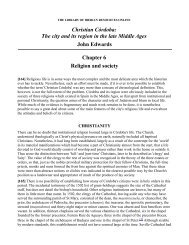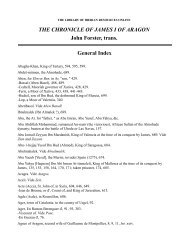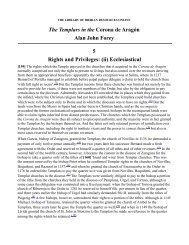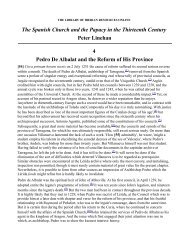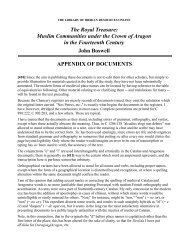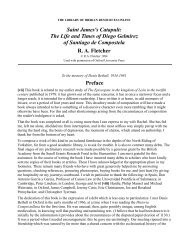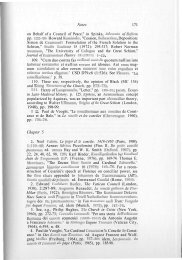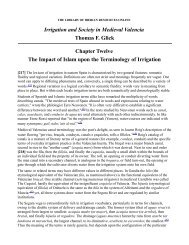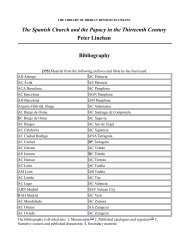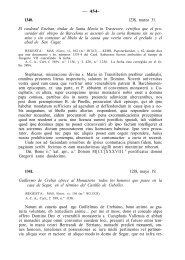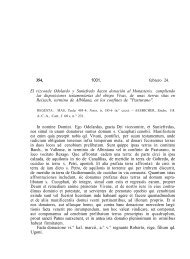PROTESTANTISM - The Library of Iberian Resources Online
PROTESTANTISM - The Library of Iberian Resources Online
PROTESTANTISM - The Library of Iberian Resources Online
You also want an ePaper? Increase the reach of your titles
YUMPU automatically turns print PDFs into web optimized ePapers that Google loves.
was less disposition to mercy, in 1630, in the case <strong>of</strong> María González, widow <strong>of</strong> Pedro Merino <strong>of</strong><br />
Canaca, one <strong>of</strong> the exceedingly rare instances <strong>of</strong> a Spanish female Protestant. To the Valladolid tribunal<br />
she freely confessed her belief and persisted in it, despite earnest and prolonged efforts to undeceive<br />
her. <strong>The</strong>re was no escape from condemning her to relaxation and the Suprema confirmed the sentence,<br />
but whether it would have been executed cannot be told for persistent labors were crowned with<br />
success; she was finally converted and the sentence was changed to reconciliation. (97) <strong>The</strong>re may have<br />
been subsequent cases <strong>of</strong> Spaniards relaxed for Protestantism, but I have not met with them. In 1678,<br />
Thomas Castillanos was kindly sent to an insane hospital by the tribunal <strong>of</strong> Toledo. In 1718, Pedro<br />
Ortiz <strong>of</strong> Valencia was reconciled with perpetual prison in the Córdova auto <strong>of</strong> April 24th, and, in that <strong>of</strong><br />
November 30, 1722, at Seville, Joseph Sánchez <strong>of</strong> Cádiz appeared as a "Calvinist and Lutheran" and<br />
was reconciled with irremissible prison. (98)<br />
<strong>The</strong> Augustinian Fray Manuel Santos de San Juan, better known as Berrocosa, would, in the sixteenth<br />
century, have been burnt as an undoubted Lutheran, although when arrested, in 1756, it was merely as a<br />
regalista or upholder <strong>of</strong> the supremacy <strong>of</strong> the State. His Ensayo de el <strong>The</strong>atro de Roma, circulated in<br />
MS., was an essay to prove this, in a manner highly <strong>of</strong>fensive to the hierarchy, and for this he was<br />
relegated for ten years to the strict convent <strong>of</strong> Risco. During his confinement he wrote tracts to prove<br />
that Rome was Babylon, that the existing Church in no way resembled that <strong>of</strong> the Apostles, that there<br />
should be no Order higher than the priesthood, that capital punishment for heresy [457] was in itself a<br />
heresy, and other doctrines which no calificador could help qualifying as the rankest Lutheranism, but<br />
Berrocosa was not relaxed, although he found associates to copy these heretical documents and<br />
circulate them. When his ten years' confinement ended, in 1767, he was again strictly secluded in a cell,<br />
from which, in 1768, he managed to escape, eluding pursuit until, in January, 1770, he was recaptured<br />
and delivered to the Toledo tribunal. Here he underwent a second trial, resulting in a sentence <strong>of</strong><br />
confinement for life in the convent <strong>of</strong> Sarria (Galicia), where he was to be kept incomunicado. (99)<br />
This case illustrates why, during the decadence <strong>of</strong> the Inquisition, we hear little or nothing <strong>of</strong><br />
Protestantism among Spaniards, although the spirit <strong>of</strong> persecution was unabated. Revolt against<br />
Ultramontanism was no longer styled Lutheranism but Regalism or Jansenism. With those whose<br />
dissidence went beyond discipline to dogma, it took the shape <strong>of</strong> the fashionable philosophy <strong>of</strong> the<br />
period and became Naturalism or Philosophism, Deism or Atheism, as the case might be. <strong>The</strong><br />
Inquisition still did its work with more or less rigor, but the arena had shifted.<br />
While thus there had been little tendency to Protestantism among natives, since the inconsiderable<br />
outbreaks <strong>of</strong> 1558, foreigners furnished an ample field <strong>of</strong> labor. Spain had a reputation for wealth<br />
which rendered it attractive to the stranger; its people held in contempt the arts and crafts in which<br />
Frenchmen and Flemings and Italians were adepts, and its internal peace seemed to <strong>of</strong>fer a refuge to<br />
those whose industries were precarious in the incessant clash <strong>of</strong> arms through which the old order <strong>of</strong><br />
things gave way to the new. Consequently every city in Spain had a considerable population <strong>of</strong><br />
foreigners, intent on earning a livelihood without much thought <strong>of</strong> spiritual matters. Some trials in the<br />
Toledo tribunal, about 1570, allude to French and Flemish printers then under arrest in Toledo,<br />
Barcelona, Alcalá, Salamanca, Valladolid and Granada. (100) In 1600, the Count <strong>of</strong> Benavente, Viceroy<br />
<strong>of</strong> Valencia, estimated the number <strong>of</strong> Frenchmen there at fourteen or fifteen thousand and added that<br />
there were vast numbers in Aragon. (101) While many <strong>of</strong> these were undoubtedly Calvinists, sedulously<br />
concealing their faith, the majority were [458] Catholics, more or less sincere, but even their orthodoxy<br />
was not <strong>of</strong> a quality to suit the Spanish standard. <strong>The</strong>y had been accustomed to live in contact with<br />
heretics; they had no such fanatical horror <strong>of</strong> heresy as was universal in Spain, and they were apt to be<br />
careless in the observances which the Spaniard regarded as indispensable. All foreigners were thus



